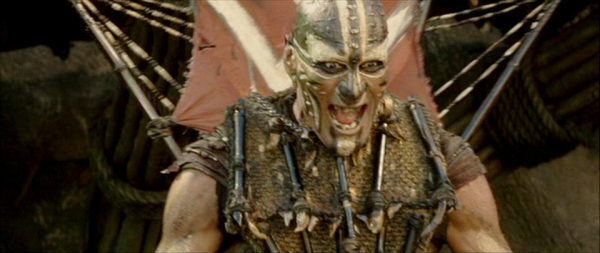The Grauniad informs us that Tolkien's myths are a political fantasy.
We’re left to take on trust from Gandalf, a manipulative spin doctor, and the Elves, immortal elitists who kill humans and hobbits for even entering their territory, when they say that the maker of the one ring is evil. Isn’t it more likely that the orcs, who live in dire poverty, actually support Sauron because he represents the liberal forces of science and industrialisation, in the face of a brutally oppressive conservative social order?
This is an amusing undergraduate thought-experiment, but as a realistic critique, it is severely flawed. The writer of the article is hardly the first to point out the problems with the descriptions of the Orcs, not to mention the even more problematic descriptions of the Easterlings and Southrons.

Personally, I always found this passage, where Sam Gamgee witnesses the death of one of these allies of the Enemy at close hand, as settling the argument:
It was Sam's first view of a battle of Men against Men, and he did not like it much. He was glad that he could not see the dead face. He wondered what the man's name was and where he came from; and if he was really evil at heart, or what lies or threats had led him on the long march from his home; and if he would not really rather have stayed there in peace.
Sam at least certainly seems to consider the dead man as fully the equal of other Men1, morally and otherwise. Since Sam is generally the voice of empathy, I think we can safely say that Tolkien did not intend any racism. Here is a more in-depth treatment of the topic.
Regardless, I think it is clear that the world of Men according to Tolkien is more like Bree, which is full of people neither wholly good nor wholly bad, although many of them are weak. After the noble first few Ages have passed, the binary distinctions go away, and with them the possibility of the simple good-versus-evil mythology of his books.
The writer of the Guardian article has got hung up on the form of the books, with a dualistic structure. This form is taken from classic mythology, which is explicitly what Tolkien was engaged in. However, the substance of the books does not bear the article's charges out, as even within that form, Tolkien manages to include many shadings into his supposedly simplistic representation.
Could it be that the Guardian is simply trying to get into the slipstream of attention generated by the last of the Hobbit films with some juvenile right-on conspiracy theorising? In that case perhaps it is hardly surprising that they completely missed the point.
-
I am using the term as Tolkien does, as placeholder for all humans. Gender relations in Tolkien's work are a whole other kettle of fish, and I am not going to get into that today! ↩